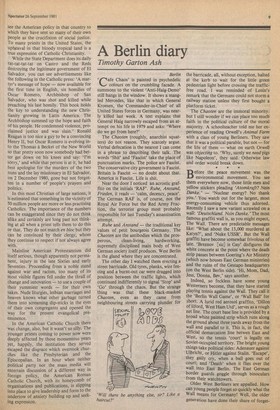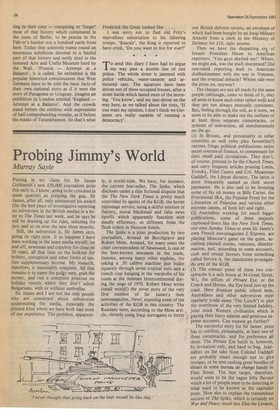A Berlin diary
Timothy Garton Ash
Berlin 'Cafe Chaos' is painted in psychedelic colours on the crumbling facade. A summons to the violent 'Anti-Haig-Demo' still hangs in the window. It shows a mangled Mercedes, like that in which General Kroesen, the Commander-in-Chief of all United States forces in Germany, was nearly killed last week. A text explains that General Haig narrowly escaped from an attempt on his life in 1979 and asks: 'Where do we go from here?'
The Chaoten (roughly, anarchist squatters) do not reason. They scarcely argue. Verbal defecation is the nearest I can come in a phrase to describing their talk. The words 'Shit' and 'Fascist' take the place of punctuation marks. The police are Fascist. The conservative city government is Fascist. Britain is Fascist — no doubt about that. America is Fascist. Life is shit.
Near the door I noticed an acrostic graffito on the initials 'RAF'. Ruhe, Anstand, Frieden, it reads — 'calm, decency, peace'. The German RAF is, of course, not the Royal Air Force but the Red Army Fraction, the terrorist group most probably responsible for last Tuesday's assassination attempt.
Ruhe and Anstand — the traditional key values of petit bourgeois Germany. The Chaoten are the antibodies which the pros perous, clean-living, hardworking, supremely disciplined main body of West German society itself produces. West Berlin is the gland where they are concentrated.
The other day I watched them erecting a street barricade. Old tyres, planks, wire fencing and a burnt-out car were dragged into position between the traffic lights, which continued indifferently to signal 'Stop' and `Go' through the chaos. But the strange thing was that these black-masked Chaoten, even as they came from neighbouring streets carrying plunder for the barricade, all, without exception, halted at the kerb to wait for the little green pedestrian light before crossing the trafficfree road. I was reminded of Lenin's remark that the Germans could not storm a railway station unless they first bought a platform ticket.
The Chaoten are the immoral minority. but I still wonder if we can place too much faith in the political culture of the moral majority. A schoolteacher told me her experience of reading Orwell's Animal Farm with a class of young Berliners. They saw that it was a political parable, but not — for the life of them — what on earth Orwell was objecting to. 'Why, surely we need pigs like Napoleon', they said. Otherwise law and order would break down.
Before the peace movement was the environmental movement. You see them everywhere now, those little men and yellow stickers pleading 'Atomkraft? Nein Danke.' — 'Nuclear energy? No thank you.' You watch out for the largest, most energy-consuming vehicle thus adorned. Recently I saw a new variant scrawled on a wall: 'Deutschland. Nein Danke.' The most famous graffiti wall is, as you might expect, The Wall. There are predictable messages like: 'What about the 13,000 murdered at Katyn?', and 'Nuke USSR'. But the Wall graffiti have become somewhat frivolous of late. 'Breznov [sic] is Gay' disfigures the white concrete at the point where the death strip passes between Goering's Air Ministry (which now houses East German ministries) and the ruins of the Gestapo headquarters (on the West Berlin side). 'Hi, Mom, Dad, Jess, Donna, Bev,' says another.
Indeed, so feckless have some young Westerners become, that they have started playing tennis against the Wall. They call it the 'Berlin Wall Game', or `Wall Ball' for short. A lurid red aerosol graffito, 'Dillon of Ilford, West Ham Utd', serves as a rough net line. The court base line is provided by a broad white painted strip which runs along the ground about three yards away from the wall and parallel to it. This is, in fact, the official demarcation line betwen East and West, so the tennis 'court' is legally on Soviet-occupied territory. The bright young things take political sides: Adenauer against Ulbricht, or Hitler against Stalin. 'Escape', they gaily cry, when a ball goes out of court; and 'Death' when it flies over the wall into East Berlin. The East German border guards goggle through binoculars from their watchtowers.
Older West Berliners are appalled. How can young people forget so quickly what the Wall means for Germany! Well, the older generation have done their share of forget ting in their time — conspiring to 'forget' most of that history which culminated in the ruins of Berlin, to be precise in the Fllh-er's bunker not a hundred yards from here. Today they solemnly tramp round an enormous exhibition devoted to a fateful part of that history and eerily sited in the restored Arts and Crafts Museum hard by the Wall. 'Prussia — Attempt at a Balance', it is called. So enfeebled is the popular historical consciousness that West Germans have to be told the basic facts of their own national story as if it were the story of Patagonia or Uruguay. Imagine an exhibition in London entitled 'England — Attempt at a Balance'. And the crowds stand before the exhibits with expressions of half-comprehending wonder, as if before the masks of Tutankhamun. So that's what Frederick the Great looked like . . . .
I was sorry not to find old Fritz's marvellous exhortation to his faltering troops. 'Rascals', the King is reported to have cried, 'Do you want to live for ever?'
To send this diary I have had to argue my way past a double line of riot police. The whole street is jammed with police vehicles, water-cannon and armoured cars. The squatters have been driven out of three occupied houses, after a street battle which lasted most of the morning. 'You know', said my taxi-driver on the way here, as we talked about the riots, 'If you want my opinion, I don't think we Germans are really capable of running a democracy'.



































 Previous page
Previous page